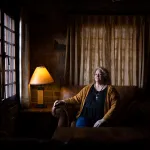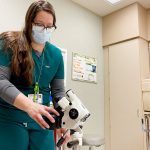If you or a loved one have experienced sexual assault and are in crisis, please call RAINN (the Rape, Abuse & Incest National Network) hotline at 1-800-656-4673 or reach out to the 24-hour chat service at rainn.org.
$347. That was the average out-of-pocket cost for sexual assault survivors who received forensic exam services as part of a rape kit from 2016 to 2018, the Kaiser Family Foundation found.
Under federal law, they weren’t supposed to pay anything at all.
The Violence Against Women Act (VAWA) — reauthorized last month as part of Congress’ omnibus spending bill — requires states to bear full out-of-pocket costs of forensic medical exams to receive federal funds for law enforcement agencies, courts and victim services. Even if victims are fully reimbursed later, states that allow hospitals to charge patients are still violating the requirements laid out for them by the Justice Department to access those funds.
But not everyone who interacts with survivors, including hospital and emergency department staff, knows that. As a result, a patchwork of state laws and a nationwide shortage of specially trained and trauma-informed examiners has led to sexual assault survivors often being billed for forensic exams that should be free, experts tell The 19th.
It’s one more burden placed on people who are already dealing with the trauma of not just assault, but also the repercussions that can come with seeking help.
After experiencing rape or sexual assault, survivors can request a rape kit examination. The process is often needed to get medical care or take evidence to the police and often allows survivors to talk to someone about what happened. A survivor can refuse any parts of the exam, including genital swabs.
Giving the survivor control over the exam is crucial to the healing process, said Jen McNew, a forensic nurse consultant in Maryland.
“Their body is the crime scene and where the evidence obviously has to be collected,” McNew said.
After survivors potentially relive the trauma that they just went through during a forensic exam, they may also — unexpectedly — be billed for it.
From 2016 to 2018, when the previous version of VAWA was in place, two-thirds of privately insured women in the United States who received a rape kit were charged out-of-pocket costs for forensic exam services, the Kaiser Family Foundation (KFF) reported last month in its analysis on policy and coverage gaps, based on a national claims database of people in large employer plans.
“If you’re going to receive VAWA funding, which all states do and they really want, you have to meet these certain guidelines,” said Ilse Knecht, policy and advocacy director at the Joyful Heart Foundation who leads the organization’s campaign to end rape kit backlogs.
The bill may go unnoticed, or the survivor may not realize what it is, said Barbara Sheaffer, a medical advocacy coordinator at the Pennsylvania Coalition Against Rape (PCAR). When a survivor is dealt an unexpected medical bill for care they sought after being assaulted, they may simply not have the emotional capacity to deal with it on top of everything else they are going through, she said.
“I have dealt with a few situations where it did not get paid and then it was sent to collections. And that is very challenging to try to get that corrected,” said Sheaffer, who works with sexual assault nurse examiners and advocates at rape crisis centers across the state.
A nationwide shortage of sexual assault nurse examiners, also known as SANEs, is a key part of why survivors are being left with bills that they should not have to pay, experts tell The 19th. SANEs, nurses who are trained to work with survivors of sexual assault, are usually the most qualified person to administer a rape kit in a hospital — and actually know how to navigate the billing process to keep survivors from getting charged.
“We kind of facilitate the entire process when they’re here,” said McNew, who has been a SANE practitioner since 2005. “But there are lots of hospitals that have no forensic nurses.”
Knecht said the unexpected bills, which she previously worked to address as early as 2005 while at the National Center for Victims of Crime, boil down to a training and policy issue within hospitals: when people in the billing department just don’t know what they should do, and hospitals haven’t made policies clear to staff.
KFF’s analysis concurs on the likelihood that hospital billing services simply did not always know the law, and also points to a lack of SANEs as one possible reason for why survivors are being charged — especially because the state may not recognize providers of medical forensic exams who are not certified SANEs.
The DOJ’s Office on Violence Against Women, which oversees grant programs authorized by VAWA, advises states receiving federal funding under the law that medical providers do need to have specialized sexual assault forensic training to administer a rape kit exam, although states can determine what that training should be.
That specification implies that states are not obligated to cover forensic exams if they are not conducted by a SANE or similarly licensed medical professional, KFF argues in its analysis.
The shortage of SANEs can also add additional financial burdens onto survivors.
Teresa Stafford, executive director of the Hope and Healing Survivor Resource Center in Ohio — which runs a rape crisis center and battered women’s shelter for Summit and Medina Counties — said that in her area, survivors are being burdened with transportation costs to reach a SANE. In the rural area of Ashtabula, Ohio, some survivors need to travel to a hospital two counties away to reach someone qualified to administer the examinations in a rape kit, she said.
“If somebody’s not trained, they are reading the instructions off of the box, step by step. You wouldn’t be comfortable with somebody providing that type of medical treatment for you in any other situation, so survivors deserve better,” she said.
Sheaffer said that sometimes even after an examination by a SANE is correctly charged to a state’s victims compensation assistance program, a patient can still receive a physician’s bill after a doctor checked up on them that day.
“That’s not allowable, but that was happening,” she said.
While some states have tried to clean up the process to keep victims from having to foot the bill, Knecht said, the end result is still an inconsistent patchwork quilt of laws.
“There are definitely these little quirks that are still leaving victims with the bill, even though they’re not supposed to,” Knecht said.
The larger “gray zone” of medical services that sexual assault victims are being charged in addition to forensic medical exams is also important to keep in mind when considering all the burdens that victims face, said Alina Salganicoff, KFF’s senior vice president and director of women’s health policy.
Survivors are often charged for other forms of medical care during their hospital visit. Most states do not cover those additional services — like X-rays, pregnancy tests, MRIs, STI testing, prescriptions, ambulance fees and additional doctor’s visits. In addition to placing more financial burdens on survivors, those charges can endanger them.
When a charge shows up on a survivors’ insurance — or is mailed to their home — hospitals may be alerting victims’ assailant that they just sought help.
Stafford said she has seen that situation play out before, when the perpetrator is on a shared insurance policy with the victim.
“We know a lot of times people who are sexually assaulted, they’re often sexually assaulted by someone they know, love and trust, and that individual can be right in their household,” she said.
Amrutha Ramaswamy, who led the KFF analysis and provides policy research services to the organization as a consultant, said the costs incurred by survivors examined in this study are just one example of the broad lack of support given to victims.
“When I was working hotlines, I did not know that people could be paying out of pocket for rape kits. I simply never thought about it,” she said. “This is something that you might not know about.”
RAINN — the Rape, Abuse & Incest National Network — said through an emailed statement that survivors, who face many barriers accessing the criminal justice system, “should never have to pay for sexual assault nurse examinations and related treatment.”
The group also pointed to resources on its website on sexual assault forensic exams and dealing with the criminal justice system.
The DOJ’s Office on Violence Against Women will contact a state’s VAWA grant administrator if it becomes aware of victims wrongly being charged for forensic medical exams, a DOJ spokesperson said in a statement. The department may freeze a state’s funding if it is uncooperative with correcting the charges, the spokesperson added.
As part of VAWA’s reauthorization this year, the nonpartisan federal watchdog — the Government Accountability Office — owes Congress a report in about eight months on how each state is funding forensic exams and how states are working to keep survivors from receiving bills. The Office on Violence Against Women looks forward to seeing the study’s results, the DOJ spokesperson said.






